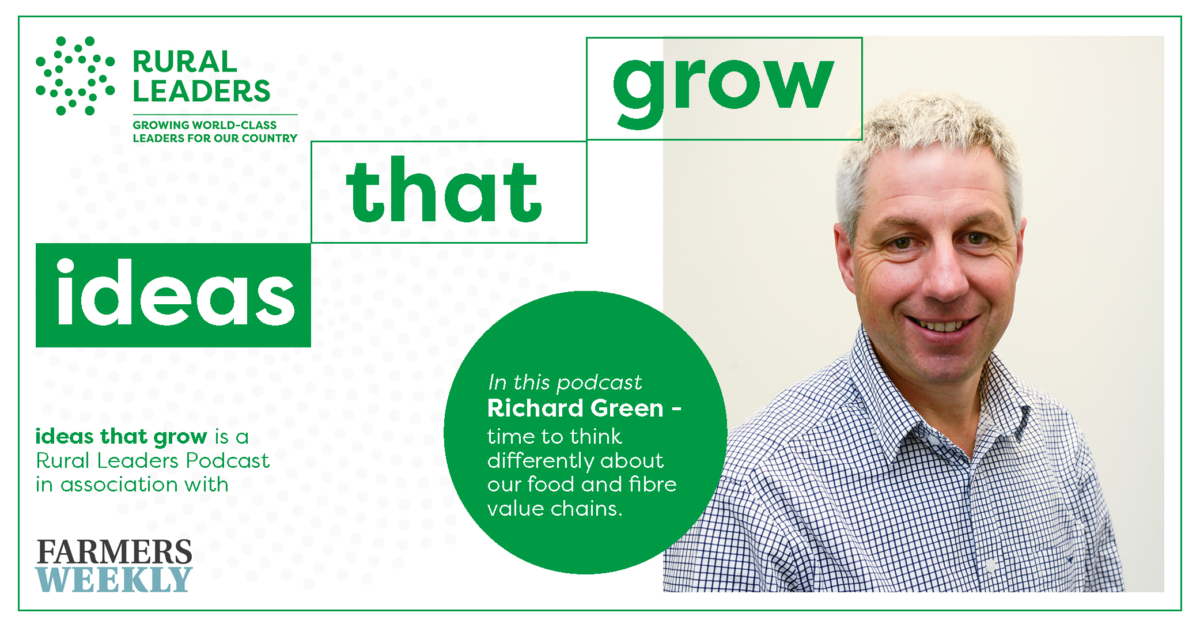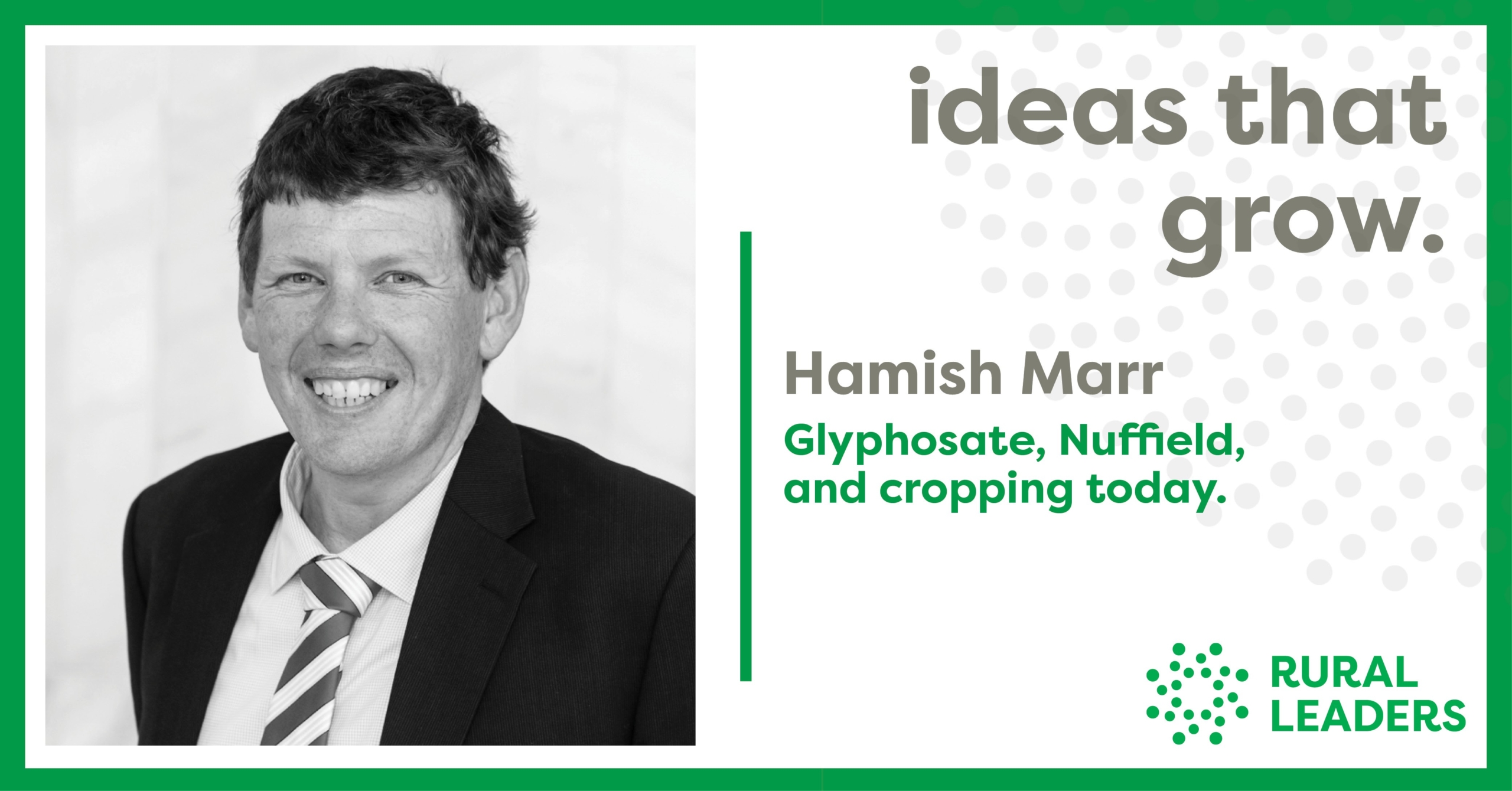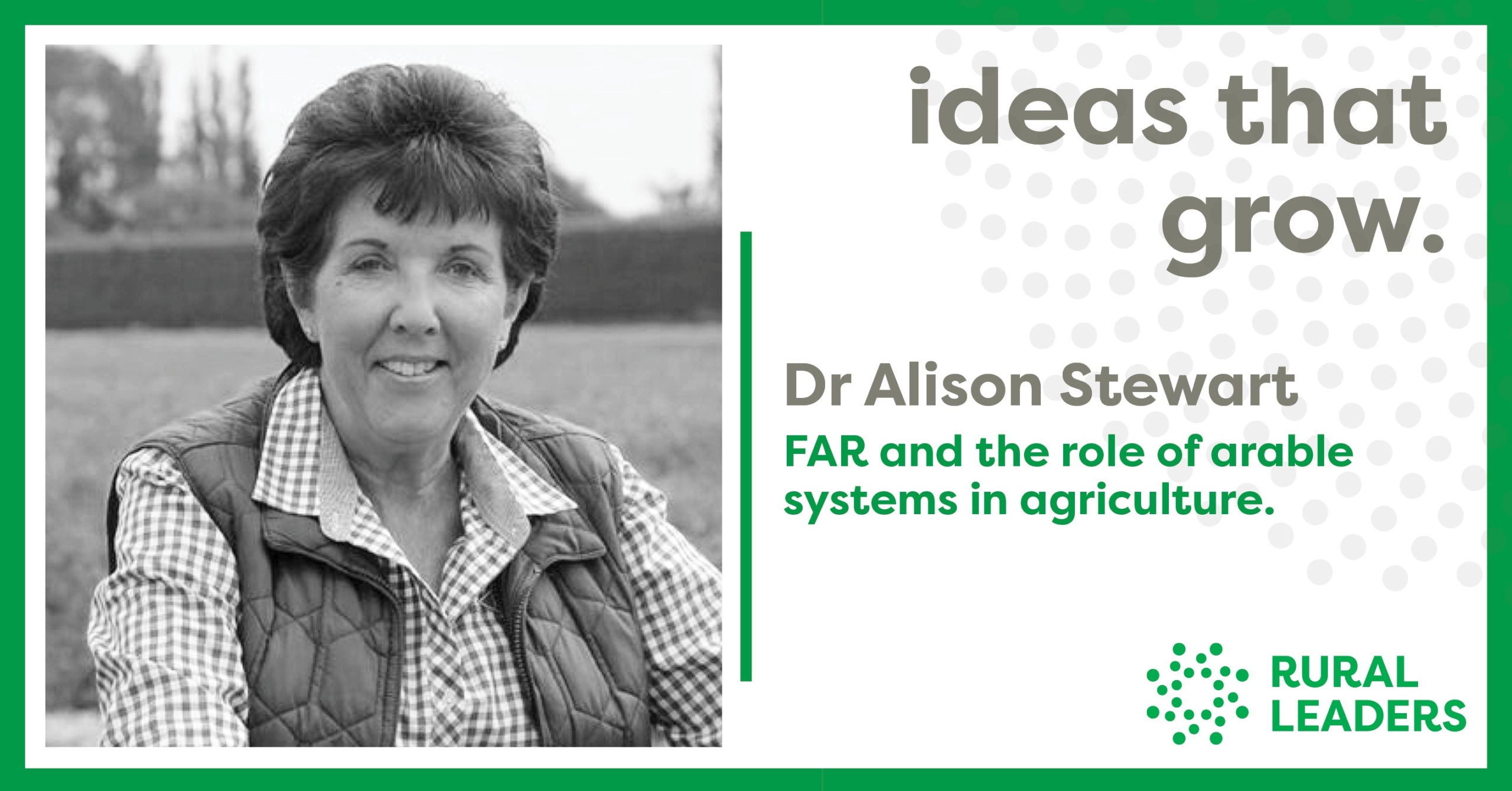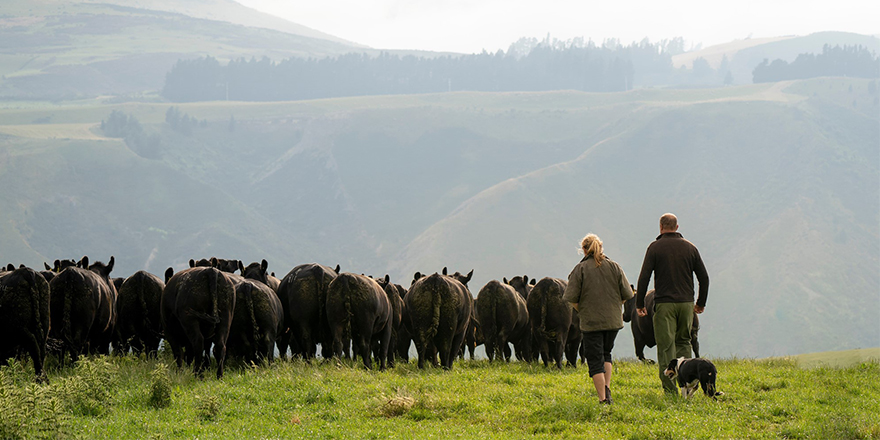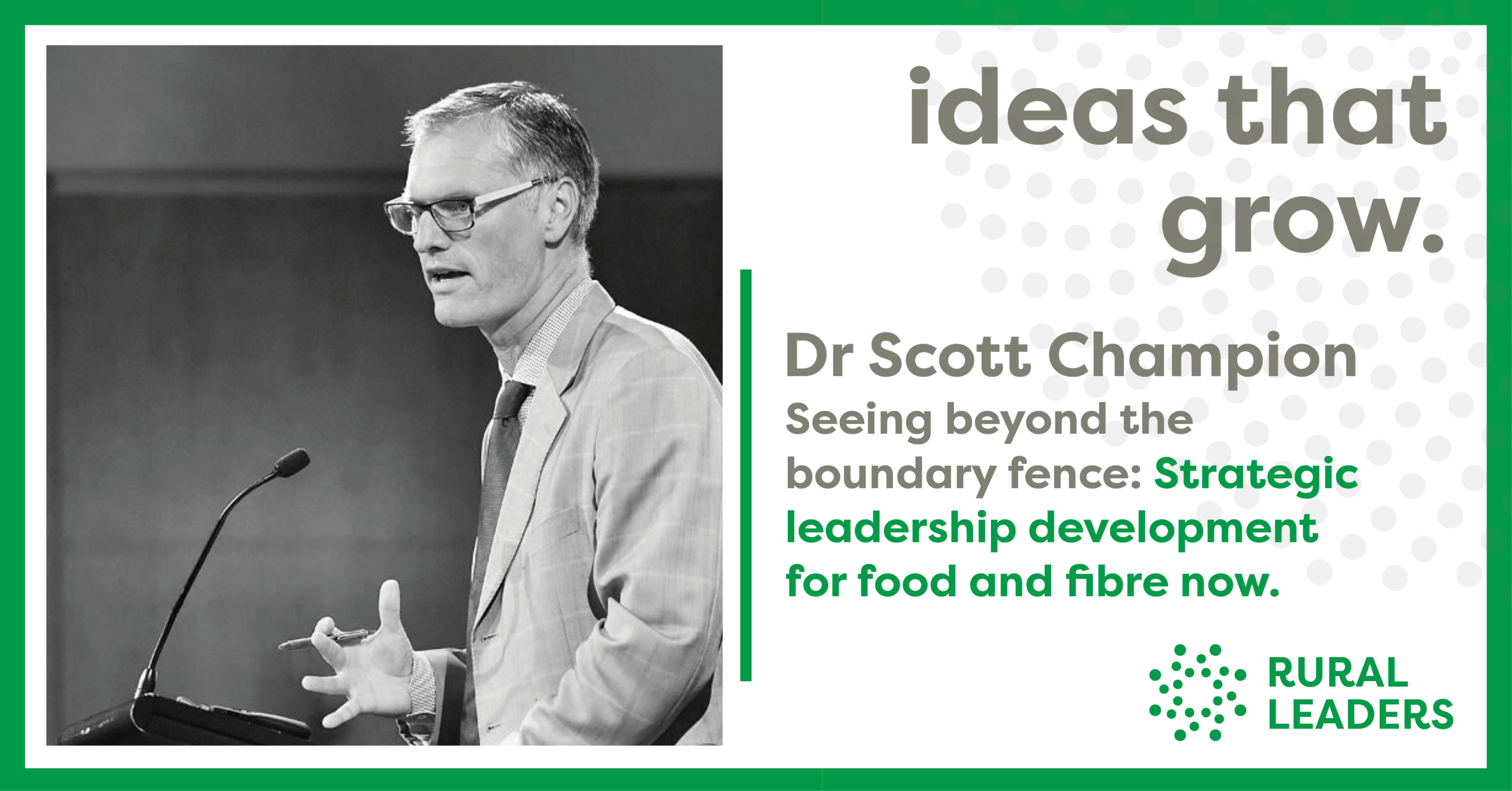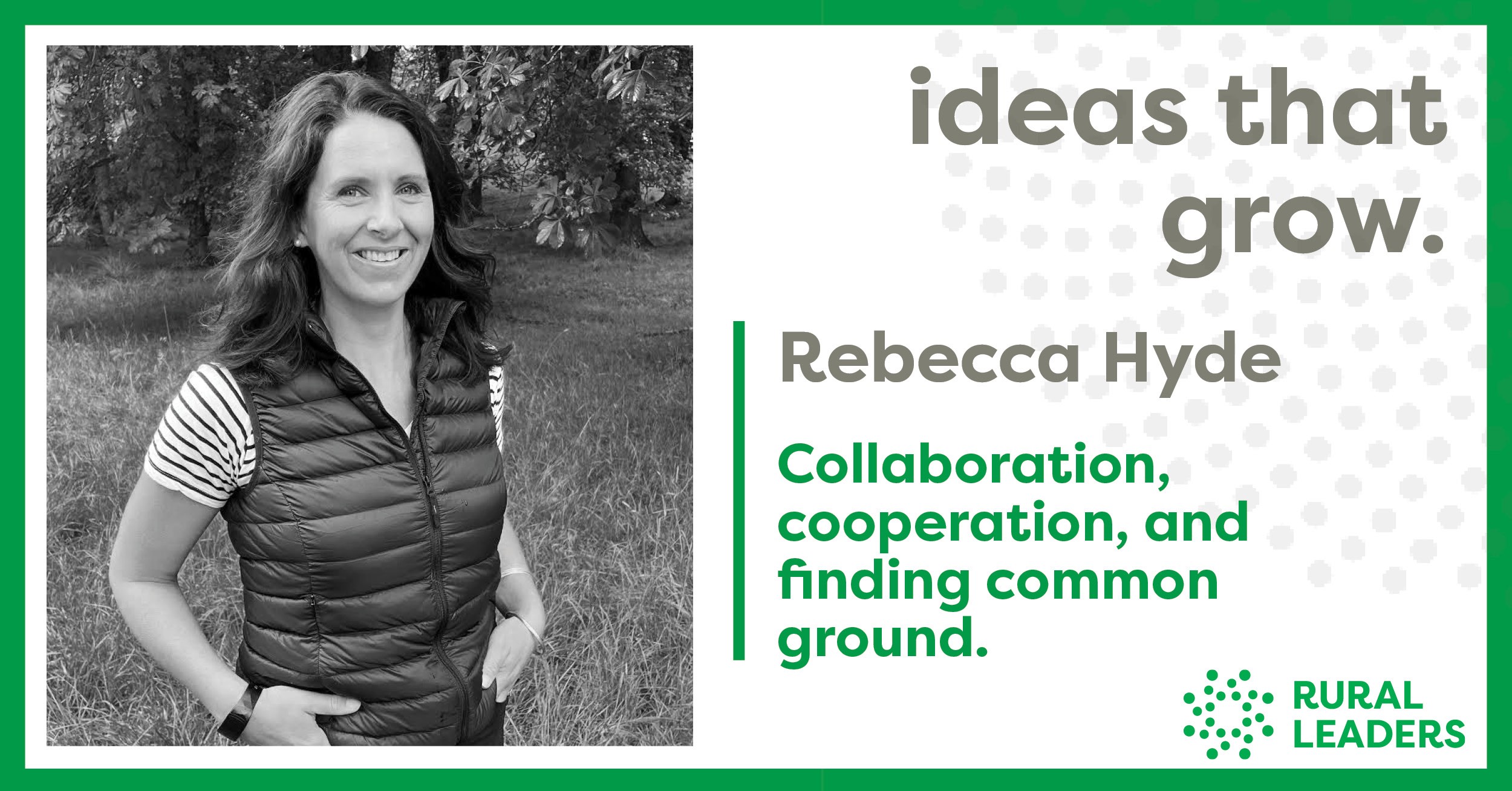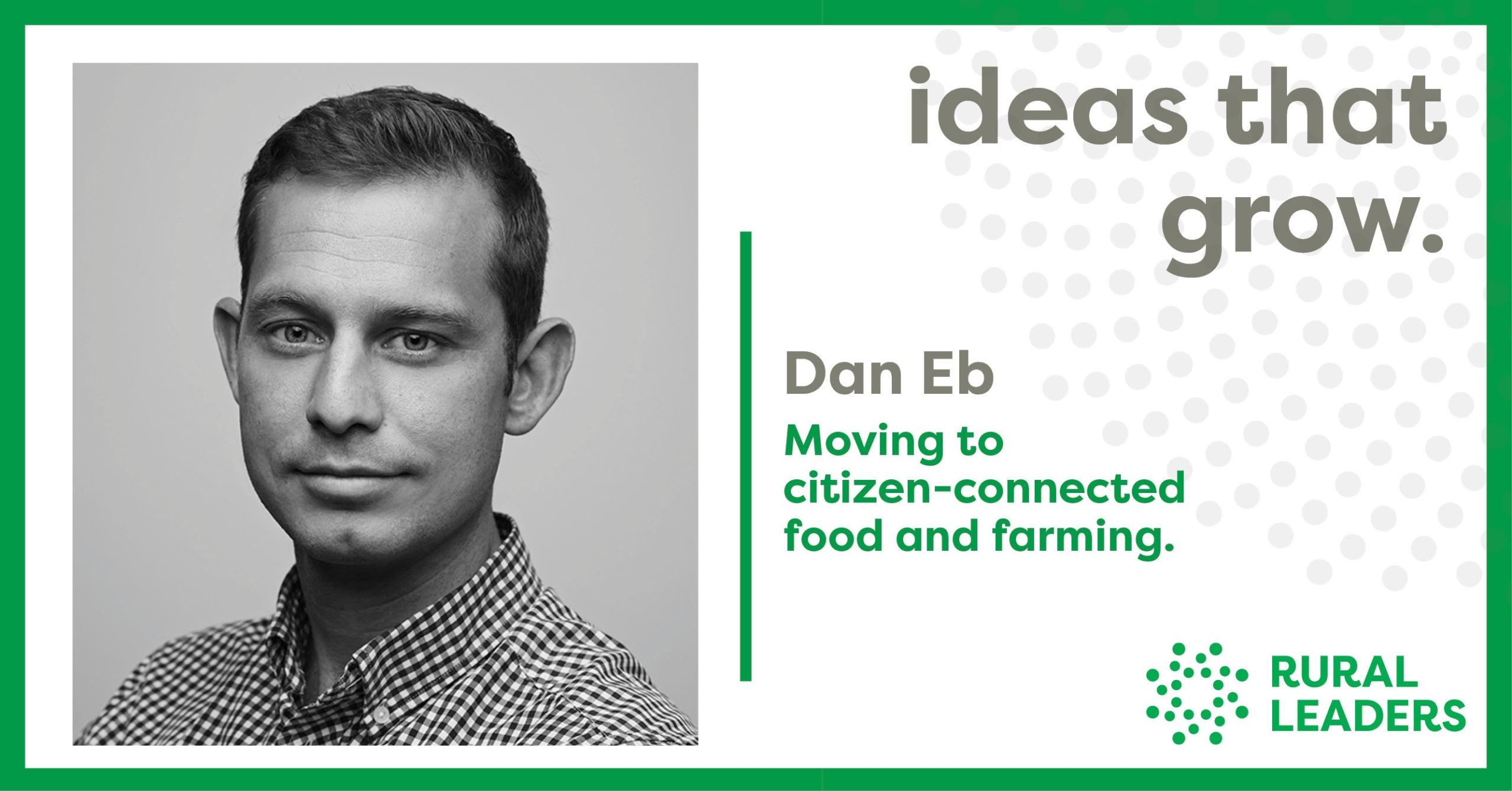In this episode of Ideas That Grow, Bryan Gibson, Farmers Weekly Managing Editor, talks to Richard Green, farmer, director and 2025 Value Chain Innovation Programme alum.
Richard discusses his background and his Value Chain Innovation Programme experience.
Richard offers keen insight into why understanding value chains and value chain models is so important for anyone wanting to take advantage of the opportunities New Zealand Inc. and farming have to integrate our value chains and think globally.
Listen to this episode of Ideas that Grow, or click on one of the platform icons below to listen on your favourite player:
Episode Transcript
You’ve joined the Ideas That Grow podcast, brought to you by Rural Leaders. In this series, we’ll be drawing on insights from innovative rural leaders to help plant ideas that grow so our regions can flourish. Ideas That Grow is presented in Association with Farmers Weekly.
Bryan Gibson, Managing Editor of Farmers Weekly:
You’ve probably heard of the Nuffield and the Kellogg Programmes, but Rural Leaders has some other programmes it administers as well. One of those is the Value Chain Innovation Programme, which is open for applications until 23 November. The programme runs in early February (2026).
With me to talk about the programme today is Richard Green, who did it earlier this year. Richard, how’s it going?
Richard Green, 2025 Value Chain Innovation Programme.
Cool, thanks, Bryan.
BG: Tell me a little bit about yourself. What do you do for a crust? Where do you live?
A diverse background in and out of food and fibre.
RG: I live just out of Christchurch, actually, in a little place called Ladbrooks, which is just on the edge of the town boundary on a few acres. But I’ve had a really interesting career to date Bryan. I’ve done lots of things, but I spent the first 10 years of my career as a farm consultant, working in the farm gate, helping businesses achieve their objectives and family farming businesses, generally.
Then the next 10 years of my career was pretty much involved beyond the farm gate, and I was involved quite deeply in the seed industry. We owned a company called Agricom, a couple of us, and we ended up selling that into PGG Wrightson Seeds. Then I ran the international business for PGG Wrightson Seeds for about five years.
Then the next The next 10 years, a bit longer actually, if I’m honest, perhaps the next 15 years, I’ve stepped out of day to day, been involved in businesses, and ended up doing a lot of governance and working across a large number of businesses. Those mainly in the agri and food sector, but a few not-for-profits and a few outside agriculture.
We’ve been deeply involved in retirement villages and commercial property and honey businesses as well, my wife and I.
BG: Yeah, so quite a diverse background. One of those governance roles you had was with Rural Leaders.
RG: Yeah, correct. When I left PGG Wrightson Seeds to stay connected with a lot of networks, I actually applied for a role. Nuffield at the time were advertising for a CE, and I applied for that role for a day a week. I did that for three years and then was involved with the trustees and pulling Kellogg into the Rural Leaders’ framework and setting up Rural Leaders. And then I was on the board for a few years after that with Rural Leaders.
I was also involved in AGMARDT and in FAR, as trustee in AGMARDT and then director on FAR, Foundation Arable Research. And both those are quite involved in Kellogg, particularly. And to speak with a lot of Kelloggers doing their projects, I think it’s absolutely fascinating, they have such good insights they get as to how the industry operates and where the opportunities are for them to add value to.
BG: The Value Chain Programme, a lot of people might not know a lot about it. That obviously offers in-depth insights into how our food and fibre sector operates, doesn’t it?
Why do the Value Chain Innovation Programme?
RG: Yes, and probably, Bryan, the more time I spend in the industry, the more I realise that we can do so much within the farmgate, and I still believe there’s lots of opportunities to improve there with technology. But a lot of the growth and the value that we can create will actually be beyond the farm gate.
The way we set an industry up to succeed, and then the way we get market signals back and align behind behaviour through the whole industry. For me, that’s why the Value Chain course, I decided this time last year, I guess, that it was something I wanted it to do.
I chair the joint venture between Headwaters and Alliance Meats, which forms the Lumina Land Programme. I’m deeply involved in that value chain. I was really looking for insights as to how do other industries operate, what’s best in class look like, even those industries that we are going really well, what would they like to change if they could wave a magic wand? I wanted to learn from everyone else that was going on the same journey as me, and so that’s why I applied.
BG: What’s actually involved when you signed up to the course? What actually happens?
What happens on the Value Chain Innovation Programme?
RG: Well, it was actually even signing up was quite an interesting process, and I assume it’s still the same, but you had to explain yourself, talk about yourself, and what you wanted to achieve out of doing the course. I probably should go back and read that again.
The process started, for us it was slightly earlier, I think this programme’s in February ’26, whereas ours was late January ’25. It involved a week of immersion in businesses and visiting businesses. I think the programme’s basically the same. We met in Hawke’s Bay on a Sunday morning, and we spent the Sunday with Professor Hamish Gow, facilitating a process talking about almost the academic view on value chains and also grounding that with his experience globally.
Those frameworks, and particularly one called the value discipline framework, that has been so helpful for me in the 10 months since then. I’ve used it so frequently as a way of thinking about value chains. Then during the week, we referred back to those models we talked about on that Sunday all the way through.
I think there’s circa 12 or 14 people on the course, all from different parts of New Zealand, all from different industries, all different ages and stages. So, actually learning their story is always a big key part of that.
And then we spent a full-on day looking in Hawke’s Bay at three different Apple businesses operating within the Apple industry, all operating slightly differently. One being TNG Global, one being Rockit, and one being Mr. Apple.
Then we drove all the way through to Rotorua that night on the bus, plus had a diversion or had an accident on the Napier Taupo Road, so we had to sit there for a couple of hours, so, we had plenty of time to talk on the bus. That’s where you really unpick the day and get everyone’s different views.
Then we spent a day and a half looking at the whole kiwifruit industry, right from R&D and new varieties, right on farm, right through the industry issues, biosecurity issues, and then deep into Zespri, or sorry, pack houses before Zespri, and then Zespri as to where their growth opportunities are, where their challenges are, and actually looking at this hugely successful industry, looking at understanding where it came from. It was a deregulated industry in the ’80s, and it was failing.
And then we went over the hill to Waikato, looked at the dairy industry, a deep-dive, the same way we did with kiwifruit, right from R&D, the milk testing station, on-farm, factories, and then where Fonterra is going. It was the Fonterra value chain we studied.
Then we also looked at the meat industry with Greenlea (Premier) Meats, and that was fascinating insight. Then we also talked about technology and how technology could disrupt value chains going forward. Then we had some case study learnings at the end of it. By the time we left on the Saturday, we were inspired, had new ways of thinking, but we were also pretty buggered!
Understanding value chains.
BG: You mentioned it earlier, as you say, lots of farmers or people in food and fibre know a lot about how to produce food on farm, how to grow grass or how to grow kiwifruit or apples, that sort of thing. But once someone comes and picks it up, a lot happens. And understanding how that works and the challenges that those who are processing and marketing our produce face, that’s really good to have a good understanding of that across the It’s a small sector, isn’t it?
RG: Yeah, and I actually now understand better also, Bryan, as a farmer sitting within the farmgate, you also need to understand who you partner with. Because how your partner is setting themselves up to win, and I use this word sitting in yourself up to win quite often because you’ve actually got to work out where your niche is right through the value chain and how you can leverage that niche to be successful. Because the profits can’t flow back to the farm unless your partner in the value chain is successful. There’s different ways of being successful. There’s no one way.
The thing we learned is some are successful because they innovate around products, and Zespri is one of them, and they have unique products, controlled by IP and they’re champions at bringing on new products to solve customer problems.
Some innovate around customers and work back from customers to solve their problems. It might be through consistency of a product or timing of delivery or something. They work back the whole value chain to solve customers’ challenges. Some, which is historically what we’ve been really good at in New Zealand, has been the lowest cost producers and providing value with a certain quality standard for the customer.
And so they are the only three areas you can win in. And the insight was you can be successful in two, but never in three. And so as a farmer, you have to know what’s your partner in the value chain, how they’re aligned themselves to win, and whether that meets what you see as you want to do, because you have to be aligned to a similar value discipline as them. So we don’t do a lot of discussion about that and talking about that because we only look at our part of the value chain.
So I think that’s what I found invaluable, and everyone on the course found invaluable, just that ability to look up and down the whole value chain and actually think about how does everyone win and how could we win far greater together if we actually work together different or better.
BG: It is so important to have that alignment of ideology, I guess. Everyone needs to know where you’re going and what your goals are. Otherwise, if you don’t get that aligned, then the chain breaks.
RG: We find that very much within our Lumina Land Programme. We’re a customer-intimacy type value chain – I worked out. I didn’t actually know that beforehand, but I probably did, but then you have a model to wrap it around. So transparency and alignment around everyone’s goals and financial incentives to align everyone around, that’s pretty important, too.
So I got considerable value and as a side note, Bryan, I always believe, and I absolutely believe, I’ve done a lot of personal development over my career, and I always tell people that there’s a 10 times return on investment. So whatever I invest, I can get 10X on that, I believe, within the next two or three years. I absolutely believe they are this Value Chain (Innovation) Programme.
I got so inspired by it I’ve committed to doing one this next January at Harvard, actually, which is a lot more expensive than the Value Chain programme, but it just has made me realise that the opportunities we’ve got as New Zealand Inc. and farming to actually integrate our value chains better and think a lot more globally.
BG: I actually never thought myself about those three ways to win, but you know it subconsciously. Giving it names and putting models and theory around it is something else again.
Think differently. Get inspired.
RG: The interesting thing is, Bryan, that all our training, my training through Lincoln, and I assume still now, and all our teachings, actually, we’re taught how to perform and operate in the operational excellence space. But it’s actually jumping that chasm and actually working back from customers and thinking of it quite differently, about marketing, about branding and around IP. We lack skills in those areas, and we lack ways to finance some of that, too. So that’s been a limitation to growing some of those business models.
I think we actually need to think a lot more like that and actually work out how we build skills in each of these. To me, there’s no right or wrong value discipline. It’s just whatever you do, you’ve got to do exceptionally well, and you’ve got to be able to carve out a niche and a point of difference from all your competitors by doing it well.
BG: In terms In terms of value chains, we quite often, in our thinking, focus on the food producer and the marketer or last seller at the end of the chain. But those things like processing the packhouses, the packaging, the transport, all that stuff, it’s not very sexy, I guess, but it’s so important.
RG: It’s absolutely critical. I can talk from experience around our Lumina Lamb, which is a partnership between the farmers with their genetics and their farming system, which is a codified farming system and the unique feed we put. Then the processor, which is Alliance Meats, and they’re processing and timely processing, where it’s all forecasted.
Also their ability to process the cuts that were required, to collect the offal when we’re trying to add value on offal and pelts, and then the transportation issues, which are huge on a global basis to get, whether it’s a container or a carton in the market. Then right through to how you partner with, in our case, chefs in food service, and how you get access to that. And yet in a big long chain, one breakdown can absolutely kill the whole chain. And so everyone’s just as important as each other, or it doesn’t work.
BG: It sounds like this programme would suit anyone in food and fibre. Everyone works in their own little space in the chain. But if you want to know about the rest of the links, then this is the course for you, I guess.
RG: What would make it really excellent, cost a lot more. But if you could get offshore and follow right back from the customer, that’s the only missing bit in that. But that’s just another level in terms of cost and time. But I think for everyone producing food, it ends up in a value chain.
Anyone who’s considering how their value chain could be optimised and having the ability to think and talk at those levels with directors, whether it’s co-ops or the companies they supply.
But even comparing and contrasting across industries. I mean, why do we see the kiwifruit industry as being successful and potentially the dairy industry versus sheep and beef? Versus the apples industry? What could we learn out of that?
Why is Rockit? What’s their target market in their niche versus Mr. Apple? How are they carving out different business models? If Anyone interested in business is really valuable. Anyone interested in sitting there saying, How do I develop skills to work out who I partner with in the future from my farm business? I think it’s very valuable.
BG: Yeah, and it has that in the field, practical, Here’s what we’re doing as a business aspect to it, but also, Hamish gives you the theory to look at it critically.
RG: Yeah, and the majority of the people in the course, when I did it last year, were practical farmers. All of us came from within the farm gate way of thinking, and we were trying to stretch ourselves beyond. That was the beauty. We’re actually all very similar from our backgrounds, although we’re from all different industries.
BG: Excellent. As I said earlier, the next value chain programme, applications are open until the 23rd of November, and the programme runs from the 8th to the 14th of February next year.
Thanks for listening to Ideas That Grow, a Rural Leaders podcast presented in Association with Farmers Weekly. For more information on Rural Leaders, the Nuffield New Zealand Farming Scholarship, the Kellogg Rural Leadership Programme, and the Value Chain Innovation Programme, please visit Ruralleaders.co.nz
